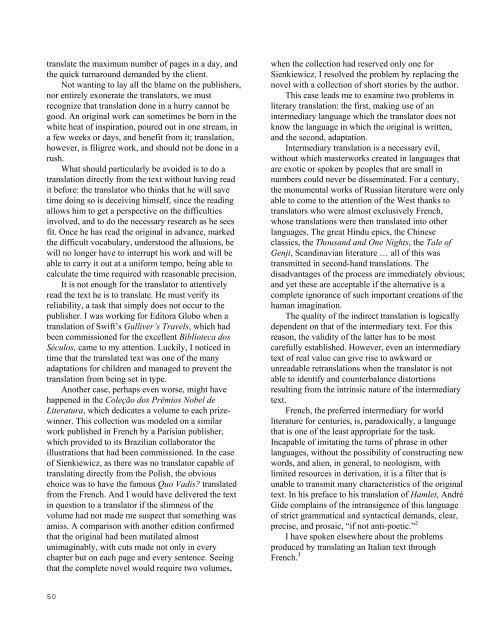their - The University of Texas at Dallas
their - The University of Texas at Dallas
their - The University of Texas at Dallas
Create successful ePaper yourself
Turn your PDF publications into a flip-book with our unique Google optimized e-Paper software.
transl<strong>at</strong>e the maximum number <strong>of</strong> pages in a day, and<br />
the quick turnaround demanded by the client.<br />
Not wanting to lay all the blame on the publishers,<br />
nor entirely exoner<strong>at</strong>e the transl<strong>at</strong>ors, we must<br />
recognize th<strong>at</strong> transl<strong>at</strong>ion done in a hurry cannot be<br />
good. An original work can sometimes be born in the<br />
white he<strong>at</strong> <strong>of</strong> inspir<strong>at</strong>ion, poured out in one stream, in<br />
a few weeks or days, and benefit from it; transl<strong>at</strong>ion,<br />
however, is filigree work, and should not be done in a<br />
rush.<br />
Wh<strong>at</strong> should particularly be avoided is to do a<br />
transl<strong>at</strong>ion directly from the text without having read<br />
it before: the transl<strong>at</strong>or who thinks th<strong>at</strong> he will save<br />
time doing so is deceiving himself, since the reading<br />
allows him to get a perspective on the difficulties<br />
involved, and to do the necessary research as he sees<br />
fit. Once he has read the original in advance, marked<br />
the difficult vocabulary, understood the allusions, he<br />
will no longer have to interrupt his work and will be<br />
able to carry it out <strong>at</strong> a uniform tempo, being able to<br />
calcul<strong>at</strong>e the time required with reasonable precision.<br />
It is not enough for the transl<strong>at</strong>or to <strong>at</strong>tentively<br />
read the text he is to transl<strong>at</strong>e. He must verify its<br />
reliability, a task th<strong>at</strong> simply does not occur to the<br />
publisher. I was working for Editora Globo when a<br />
transl<strong>at</strong>ion <strong>of</strong> Swift’s Gulliver’s Travels, which had<br />
been commissioned for the excellent Biblioteca dos<br />
Séculos, came to my <strong>at</strong>tention. Luckily, I noticed in<br />
time th<strong>at</strong> the transl<strong>at</strong>ed text was one <strong>of</strong> the many<br />
adapt<strong>at</strong>ions for children and managed to prevent the<br />
transl<strong>at</strong>ion from being set in type.<br />
Another case, perhaps even worse, might have<br />
happened in the Coleção dos Prêmios Nobel de<br />
Liter<strong>at</strong>ura, which dedic<strong>at</strong>es a volume to each prizewinner.<br />
This collection was modeled on a similar<br />
work published in French by a Parisian publisher,<br />
which provided to its Brazilian collabor<strong>at</strong>or the<br />
illustr<strong>at</strong>ions th<strong>at</strong> had been commissioned. In the case<br />
<strong>of</strong> Sienkiewicz, as there was no transl<strong>at</strong>or capable <strong>of</strong><br />
transl<strong>at</strong>ing directly from the Polish, the obvious<br />
choice was to have the famous Quo Vadis transl<strong>at</strong>ed<br />
from the French. And I would have delivered the text<br />
in question to a transl<strong>at</strong>or if the slimness <strong>of</strong> the<br />
volume had not made me suspect th<strong>at</strong> something was<br />
amiss. A comparison with another edition confirmed<br />
th<strong>at</strong> the original had been mutil<strong>at</strong>ed almost<br />
unimaginably, with cuts made not only in every<br />
chapter but on each page and every sentence. Seeing<br />
th<strong>at</strong> the complete novel would require two volumes,<br />
when the collection had reserved only one for<br />
Sienkiewicz, I resolved the problem by replacing the<br />
novel with a collection <strong>of</strong> short stories by the author.<br />
This case leads me to examine two problems in<br />
literary transl<strong>at</strong>ion: the first, making use <strong>of</strong> an<br />
intermediary language which the transl<strong>at</strong>or does not<br />
know the language in which the original is written,<br />
and the second, adapt<strong>at</strong>ion.<br />
Intermediary transl<strong>at</strong>ion is a necessary evil,<br />
without which masterworks cre<strong>at</strong>ed in languages th<strong>at</strong><br />
are exotic or spoken by peoples th<strong>at</strong> are small in<br />
numbers could never be dissemin<strong>at</strong>ed. For a century,<br />
the monumental works <strong>of</strong> Russian liter<strong>at</strong>ure were only<br />
able to come to the <strong>at</strong>tention <strong>of</strong> the West thanks to<br />
transl<strong>at</strong>ors who were almost exclusively French,<br />
whose transl<strong>at</strong>ions were then transl<strong>at</strong>ed into other<br />
languages. <strong>The</strong> gre<strong>at</strong> Hindu epics, the Chinese<br />
classics, the Thousand and One Nights, the Tale <strong>of</strong><br />
Genji, Scandinavian liter<strong>at</strong>ure … all <strong>of</strong> this was<br />
transmitted in second-hand transl<strong>at</strong>ions. <strong>The</strong><br />
disadvantages <strong>of</strong> the process are immedi<strong>at</strong>ely obvious;<br />
and yet these are acceptable if the altern<strong>at</strong>ive is a<br />
complete ignorance <strong>of</strong> such important cre<strong>at</strong>ions <strong>of</strong> the<br />
human imagin<strong>at</strong>ion.<br />
<strong>The</strong> quality <strong>of</strong> the indirect transl<strong>at</strong>ion is logically<br />
dependent on th<strong>at</strong> <strong>of</strong> the intermediary text. For this<br />
reason, the validity <strong>of</strong> the l<strong>at</strong>ter has to be most<br />
carefully established. However, even an intermediary<br />
text <strong>of</strong> real value can give rise to awkward or<br />
unreadable retransl<strong>at</strong>ions when the transl<strong>at</strong>or is not<br />
able to identify and counterbalance distortions<br />
resulting from the intrinsic n<strong>at</strong>ure <strong>of</strong> the intermediary<br />
text.<br />
French, the preferred intermediary for world<br />
liter<strong>at</strong>ure for centuries, is, paradoxically, a language<br />
th<strong>at</strong> is one <strong>of</strong> the least appropri<strong>at</strong>e for the task.<br />
Incapable <strong>of</strong> imit<strong>at</strong>ing the turns <strong>of</strong> phrase in other<br />
languages, without the possibility <strong>of</strong> constructing new<br />
words, and alien, in general, to neologism, with<br />
limited resources in deriv<strong>at</strong>ion, it is a filter th<strong>at</strong> is<br />
unable to transmit many characteristics <strong>of</strong> the original<br />
text. In his preface to his transl<strong>at</strong>ion <strong>of</strong> Hamlet, André<br />
Gide complains <strong>of</strong> the intransigence <strong>of</strong> this language<br />
<strong>of</strong> strict gramm<strong>at</strong>ical and syntactical demands, clear,<br />
precise, and prosaic, “if not anti-poetic.” 2<br />
I have spoken elsewhere about the problems<br />
produced by transl<strong>at</strong>ing an Italian text through<br />
French. 3<br />
50

















